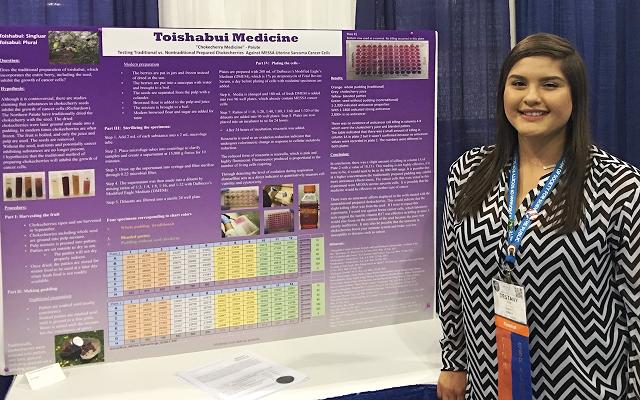 |
Canku Ota
|
 |
|
(Many Paths)
|
||
|
An Online Newsletter
Celebrating Native America
|
||
|
July 2017 - Volume 15
Number 7
|
||
|
|
||
|
Bringing Science
and Culture Together with Chokecherry Pudding
|
||
|
by Sarah Sunshine Manning
- Indian Country Today
|
||
|
Native American
student proves traditional chokecherry pudding is medicine
The indigenously treasured chokecherry tree spans the North American continent, from British Columbia to Newfoundland, and down into the northern half of the United States. The vitamin and mineral-rich fruit of the tree has been a staple among many Native American tribes for millennia, and according to one Native American student's recent science project, chokecherries wield medicinal properties that extend beyond prior knowledge—in fact, cancer-fighting properties. High school student, Destany "Sky" Pete, of the Shoshone and Paiute Tribes of the Duck Valley Indian Reservation in Idaho and Nevada, developed interest in the medicinal properties of the chokecherry, which is still harvested and consumed in her community today. Traditionally, the Shoshone and Paiute prepared chokecherry pudding, known as toishabui, in the Paiute language. "The traditional (Shoshone and Paiute) method of preparing chokecherry pudding includes the seed of the chokecherry, crushed up," Pete, a junior at Owyhee High School in Nevada, told ICMN. "Nowadays, some people just kind of juice the berry and take out the seed completely. But maybe the seed has medicine that can help us to stay well." Pete's curiosity concerning the necessity of the chokecherry seed was inspired by a conversation she had with a traditional leader in the community, who stressed that the reason for so many recent illnesses within the tribe was the lack of traditional foods being consumed, and specifically, traditional chokecherry pudding. Motivated by that conversation, and her passion for science, Pete embarked on an ambitious school science project. She sought out to test the hypothesis, that chokecherries are medicine, and to find answers to a more specific question: Can the traditional preparation of chokecherry pudding, including the seed, inhibit the growth of cancer cells? To conduct this experiment, Pete's high school science teacher, Dietlinde Dann, connected her with a biochemistry professor at Boise State University, Dr. Ken Cornell, who works with uterine sarcoma cancer cells. At the university, Pete tested four different specimens of chokecherries by combining them with uterine sarcoma cancer cells, then, allowed a 24-hour incubation period. Pete found that out of the four different specimens tested, the traditionally-prepared chokecherry pudding specimen had cancer inhibiting properties, while the specimens without the seed, or, with the chokecherry juice, alone, did not succeed at killing the uterine sarcoma cancer cells. "It was the traditional preparation of toishabui with the crushed seeds that had the results," Pete said. During the 24-hour incubation period, the mixture of toishabui and the uterine sarcoma cancer cells resulted in a small amount of cancer cell killing; however, Pete said that a longer incubation period or a stronger dilution could yield stronger results. "We can also try the experiment on different types of cancer cells in the future," she said. "I really want to do the same test on breast cancer cells." After the completion of her project, Pete entered into the 2017 Elko County Science Fair in northern Nevada. Impressively, out of over 440 science project entries, Pete was honored with a First Grand Prize award, for linking traditional chokecherry pudding, with the reduction of uterine sarcoma cancer cells. The prestigious prize earned Pete a $500 scholarship, and a collection of other awards and accolades from the likes of the Navy and the Air Force. Pete's win also qualified her for the Intel International Science Fair, held in Los Angeles, California, on May 14 -19. At the International Science Fair, Pete competed against roughly 1,800 other high school students from more than 75 countries. And while she didn't bring home the top prize this time around, Pete was honored to represent her community. "I'm proud to be Native American," Pete told ICMN. "And I want people to know that science and culture can be represented together." After high school, Pete hopes to attend Stanford University and major in biology, then attend the University of California Davis Veterinary School. She hopes to return to the reservation to open up her own veterinarian practice. "There is so much out there in the world. You can go to college, and do anything, and then come back to your community," she said. As for her science project win and the cultural affirming knowledge gained, Pete said, "I feel like our ancestors were really healthy. Nowadays, we're prone to diabetes and other diseases. But back then, it was our food that made us healthy." To the delight of her community and many other Indigenous Peoples, Pete's science project affirmed what elders have been saying for generations: Traditional diets, including the esteemed chokecherry and chokecherry pudding, are so much more than food. They are medicine—just don't forget the seeds. |
||
|
|
|
|
||
|
|
||
| Canku Ota is a free Newsletter celebrating Native America, its traditions and accomplishments . We do not provide subscriber or visitor names to anyone. Some articles presented in Canku Ota may contain copyright material. We have received appropriate permissions for republishing any articles. Material appearing here is distributed without profit or monetary gain to those who have expressed an interest. This is in accordance with Title 17 U.S.C. Section 107. | ||
|
Canku Ota is a copyright ©
2000 - 2017 of Vicki Williams Barry and Paul Barry.
|
||
 |
 |
|
|
The "Canku
Ota - A Newsletter Celebrating Native America" web site and
its design is the
|
||
|
Copyright ©
1999 - 2017 of Paul C. Barry.
|
||
|
All Rights Reserved.
|
||
